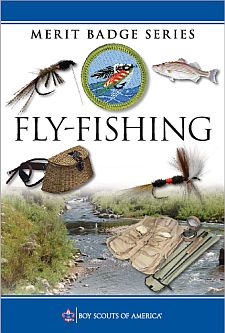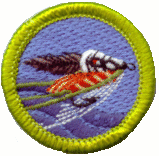- Do the following: Explain
to your counselor the injuries that could occur while fly-fishing and
the proper treatment, including cuts, scratches, puncture wounds, insect
bites, hypothermia, dehydration, and heat reactions. Explain how to
remove a hook that has lodged in your arm. Name and explain five safety
practices you should always follow while fly-fishing.
- Discuss the prevention of and treatment for the following health concerns that could occur while fly-fishing, including cuts, scratches, puncture wounds, insect bites, hypothermia, dehydration, heat exhaustion, heatstroke, and sunburn.
- Explain how to remove a hook that has lodged in your arm.
- Name and explain five safety practices you should always follow while fly-fishing.
- Discuss Demonstrate how to match a fly rod, line and leader to get achieve a balanced system. Discuss several types of fly lines, and explain how and when each would be used. Review with your counselor how to care for this equipment.
- Demonstrate how to tie proper knots to prepare a fly rod for fishing:
- Tie a backing to a fly reel spool using the arbor backing knot
- Attach backing to fly line using the nail knot
- Attach a leader to fly line using the needle knot, nail knot or a loop-to-loop connection
- Add a tippet to a leader using a double surgeon's loop loop-to-loop connection or blood knot
- Tie a fly onto the terminal end of the leader using the improved clinch knot
- Explain how and when each of the following types of flies is are used: dry flies, wet flies, nymphs, streamers, bass bugs, and poppers , and saltwater flies. Tell what each one imitates. What doeseach imitate? Tie at least two types of the flies mentioned in this requirement.
- Demonstrate the ability to cast a fly 30 feet consistently and accurately using both overhead and roll cast techniques.
- Go to a suitable fishing location and make observations on the types of insects what fish may be eating both above and beneath the water's surface. Look for flying insects and some that may be on or beneath the water's surface. Look under rocks. Explain the importance of matching the hatch.
- Do the following: Explain
the importance of practicing Leave No Trace and how it positively affects
fishing resources.
- Explain the importance of practicing Leave No Trace techniques. Discuss the positive effects of Leave No Trace on fishing resources.
- Discuss the meaning and importance of catch and release. Describe how to properly release a fish safely to the water.
- Obtain and review a copy of the regulations affecting game fishing where you live or where you pan to fish. Explain why they were adopted and what you accomplish is accomplished by following them.
- Explain Discuss what good outdoor sportsmanlike behavior is and how it relates to fishermen anglers. Tell how the Outdoor Code of the Boy Scouts of America relates to a fishing enthusiast, including the aspects of littering, trespassing, courteous behavior, and obeying fishing regulations.
- Using the fly-fishing techniques you have learned,
catch two different kinds of fish and identify them. Release at least
one of them unharmed. Clean and cook another fish.
Catch at least one fish. If regulations and health concerns permit, clean and cook a fish you have caught. Otherwise, acquire a fish and cook it.
BSA Advancement ID#:
136
Requirements last updated in:
2010
Pamphlet Publication Number:
35900
Pamphlet Stock (SKU) Number:
35824
Pamphlet Revision Date:
2009
| Worksheets for use in working on these requirements: | Format | |
|---|---|---|
| Word Format | PDF Format | |
Page updated on: November 18, 2021









